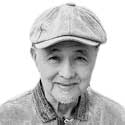
Musings
By Oscar P. Lagman, Jr.

As the nurse aide helped me get settled in my hospital bed the day after Election Day, she noticed the indelible ink on my index finger. “Sir, you were able to vote in spite of your condition? I hope your candidates won,” she said as she tried to open a friendly conversation with me. I responded by asking if her own candidates won. She said happily, “Yes, Bam Aquino and Kiko Pangilinan.” Then she added, sounding apologetic, “Also Bong Go. I voted for him because of his Malasakit program. A relative of mine benefitted largely from it.”
That must be the same reason why 29.6 million out of 55.9 million total voters (53%) voted for Bong Go. As a senator, he identified himself as an ardent advocate for public health. During the campaign period, he highlighted the continued expansion of health-related services during his first term as senator. “Malasakit Center, that’s a law that we passed,” he boasted. He projected himself to the electorate as “Mr. Malasakit.”
Malasakit Centers provide financial assistance to the indigent and financially incapacitated patients without their having to go out of the hospital to seek assistance from the participating agencies — the departments of Health and of Social Welfare and Development, PhilHealth, the Philippine Charity Sweepstakes Office, and the Philippine Amusement and Gaming Corp.
Usually, the topnotcher among the winning senatorial candidates is either a veteran politician like Frank Drilon in 2016 and Cynthia Villarin in 2019, or a popular entertainment personality like Tito Sotto in 1992, Bong Revilla in 2010, and Robinhood Padilla in 2022.
Bong Go is not either of the two. Go rose into prominence when Davao City Mayor Rodrigo Duterte ran for president in 2016. He came to be known as the loyal aide of Mayor Duterte. When Mayor Duterte was elected president, Bong Go continued to serve as his aide.
In 2019, President Duterte endorsed Bong Go as a candidate for senator. He placed third in that year’s senatorial race. Upon his election to the Senate, President Duterte directed him to set up a center by which government medical assistance would be given to indigent Filipinos. The first Malasakit Center opened in February 2018.
Upon his election as senator in 2019, Go continued to promote the Malasakit Center. He authored a bill in the Senate that would institutionalize the Malasakit concept. President Duterte signed into law on Dec. 3, 2019, the Malasakit Center Act, also known as Republic Act No. 11463.
The law obliges the government to establish Malasakit Centers in all hospitals under the Department of Health (DoH). The law also authorizes the Philippine National Police to set up such facilities. It is clear from the provisions of the law that Malasakit Centers are not healthcare delivery facilities. They are pay stations in hospitals.
Go’s emergence as topnotcher among the winning senatorial candidates indicates that free or affordable healthcare is the main concern of the citizenry. The amendment of the Universal Health Care (UHC) Act, RA 11223, should therefore be the top priority of the incoming 20th Congress. RA 11223 was intended to establish a healthcare delivery system that would provide affordable quality healthcare services for all citizens of the Philippines.
The World Health Organization (WHO) constitution of 1948 declared health a fundamental human right. In 2015, the United Nations adopted a resolution urging developing economies to institute universal healthcare by 2030.
UHC means affordable, acceptable, available, and accessible healthcare services for all citizens of the Philippines. For UHC to achieve its goal, several factors must be in place, including: a strong, efficient, well-run health system that meets priority health needs, meaning healthcare facilities like hospitals and primary care units, and a sufficient number of well-trained health workers like doctors, nurses, and medical technicians to provide the services.
Quality healthcare makes UHC a large expense for governments. It is usually funded by general income taxes like in the United Kingdom and Cuba, where government-owned hospitals and government-employed professionals provide healthcare for free. Every citizen gets the same quality of healthcare.
While the Philippine government also owns hospitals and employs healthcare workers, their numbers fall way short of those required to provide the health services needed by the 112 million Filipinos. In many parts of the country, farm workers, market vendors, food stall operators, tricycle/jeepney drivers, and retail store attendants who fall ill do not get proper medical attention due mainly to the inaccessibility of a healthcare facility.
WHO recommended there be 20 hospital beds per 10,000 population. Based on DoH data, all regions have insufficient beds relative to the population except for Metro Manila.
WHO had advised our legislators to implement universal healthcare fully in 2030 when the country’s health delivery system would be capable of servicing UHC. But Senators JV Ejercito, Sonny Angara, Nancy Binay, and Cynthia Villar, who were all running for re-election in 2019, rushed a universal healthcare bill to President Duterte for his signature so that they could present UHC in the elections of 2019 as their gift to the Filipino people. President Duterte signed into law Republic Act No. 11223, or An Act Instituting Universal Health Care for All Filipinos.
RA 11223 does not require the expansion of the country’s healthcare delivery system to provide affordable quality healthcare services for all citizens of the Philippines. It automatically enrolled all Filipino citizens in PhilHealth. As mentioned above, almost all regions have insufficient hospital beds relative to the population.
So, many patients are turned away by government hospitals. Poor folks denied admission just go home to their shack or hut, treat themselves with herbal remedies or consult the neighborhood arbolaryo (herbalist/healer).
The public hospitals are overcrowded, so income earners seek medical attention in private hospitals. Most of them were established for profit. Their payment system is independent of the strict guidelines observed in government-owned hospitals. As the physician-stockholder of private hospitals enjoys full discretion in using the hospital’s facilities, his practice is influenced by the incentives available to him.
He may recommend longer hospital confinements and much more surgery than necessary. When generic drugs are as efficacious, he prescribes the newest and therefore more expensive medicine, for which act he is rewarded by the manufacturer with a fully-paid-for vacation abroad disguised as attendance of a medical convention.
A number of medical directors of non-profit and philanthropic medical institutions in the US have said much of the waste and excess utilization that takes place in laboratory, radiology, and pharmacy may be unnecessary and even potentially dangerous. The extra but unnecessary services and wonder drugs account for the findings of the researchers of the Philippine Institute of Development Studies — that PhilHealth members pay 60% of their hospital bill out of pocket.
In my case, I paid 78% of the total bill, which was net of the 20% senior citizen discount. In previous hospital episodes, before the benefit packages were upgraded, I sometimes paid as much as 92%. The painful fact is that the country has not really instituted universal healthcare.
The amended UHC law should require the government to build more healthcare facilities, to be funded by general income taxes, sin taxes, the Philippine Charity Sweepstakes Office, and the Philippine Amusement and Gaming Corp. The law should also require the facilities to be manned by professionals employed by the government. That way, Filipino can avail themselves of free or affordable healthcare services. There would be no need for Malasakit Centers because the facilities are Malasakit Centers themselves.
Oscar P. Lagman, Jr. was country manager for a health insurance company. He also had substantive participation in USAID healthcare projects.